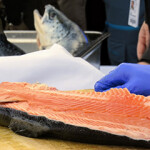Scotland emulating Norway in its fish-farming regulatory reforms

An independent and long-awaited review of fish-farm regulation has been initiated by the Scottish government. It aims to identify the best way to reform and streamline the current system of industry governance and establish a new single determining authority, modeled on the regulatory regime in Norway.
Russel Griggs, an honorary professor at the University of Glasgow, has been appointed to lead the first phase of the review. Griggs, who also chairs the Scottish government’s regulatory review group, was appointed due to his experience in this field. He will report to the Scottish government’s aquaculture review team, which includes members from Marine Scotland, and the Environment and Forestry and Planning and Architecture Directorates. His report is due between the end of November to mid-December.
The review is the result of a commitment made by the ruling Scottish National Party (SNP) in the run-up to the May 2021 Scottish Parliamentary elections. It is part of a “first steps” list of actions to be initiated within 100 days of regaining power.
The SNP platform identified fish farming as a sector Scotland is well-placed to excel in globally, if it can grow sustainably and in harmony with the marine environment. By streamlining regulatory processes, SNP said it hopes finfish aquaculture development can be made more responsive, transparent, and efficient.
“Aquaculture is a significant contributor to our rural economy, providing well-paid jobs in some of Scotland’s most fragile communities and will be an essential part of our green recovery and transition to net zero. However, reports and parliamentary activity over the last few years have made clear that the regulatory landscape is contentious and there is a need for improved efficiency, effectiveness, and transparency,” Rural Affairs Secretary Mairi Gougeon said in a government release.
The 2016 Independent Review of Scottish Aquaculture Consenting and the 2020 Salmon Interactions Working Group report, along with the 2018 inquiry into the environmental impacts of salmon farming by the Scottish Environment, Climate Change and Land Reform (ECCLR) Committee, all highlighted areas for improvement within the current system of regulation.
The ECCLR Committee concluded in its report that “the current consenting and regulatory framework, including the approach to sanctions and enforcement, is inadequate to address the environmental issues.”
“The committee is not convinced the sector is being regulated sufficiently or regulated sufficiently effectively,” it said. “This needs to be addressed urgently because further expansion must be on an environmentally sustainable basis.”
Griggs is tasked with making recommendations for further work in relation to improved efficiency and more fundamental institutional reform, following a review of the existing evidence base and engagement with key aquaculture industry stakeholders and those from the wider marine community. They include tourism groups, wild-catch fisheries and sport fishermen, marine conservation societies, local coastal communities, and current regulatory bodies. The regulation of marine fish grown at sea and on land, freshwater fish, seaweed, and shellfish farms are all included in the group’s remit.
“It is clear we need a strategic analysis of the issues that need fixing based on a good understanding of work to-date, sound evidence on the current workings of the system, and an accurate appraisal of what people actually think about its operation,” Gougeon stated in a letter addressed to Griggs.
In response, Griggs acknowledged that the review of this important sector is both timely and necessary.
“The industry faces significant challenges and also has its critics, but I will approach this review with an open mind and engage with stakeholders from across the aquaculture spectrum. Only by doing this will we be able to deliver improvements in the regulatory landscape in the short-term and identify options for further reform in the longer term,” Griggs said.
Findings from the report and recommendations will be reviewed before publication, and the subsequent second phase of the project is expected to commence in the summer of 2022, which will include consultancy appointments to research and analyse international comparators, looking at the efficiency of the system, and undertaking institutional engagement before the group makes its recommendations for changes to the current framework.
Phase three, planned to commence in late 2023, will include government review of the report and its recommendations, followed by public consultation and potential implementation of reforms.
The entire body of work will be carried out to meet the Scottish government’s policy objective of protecting the environment, growing the aquaculture sector as a source of low-carbon protein, and maintaining decision-making ability at the local level in order, the SNP said in its announcement.
Photo courtesy of University of Glasgow






Share